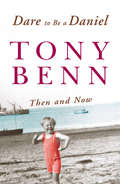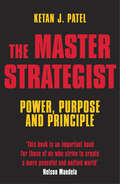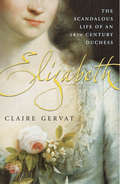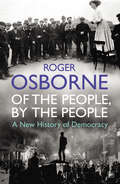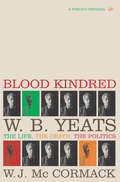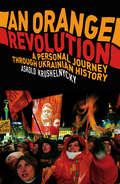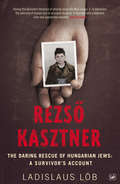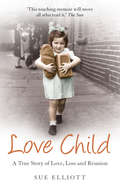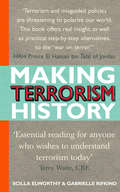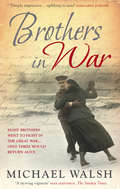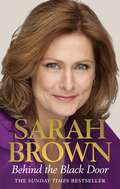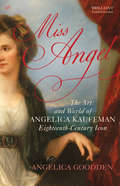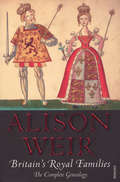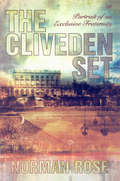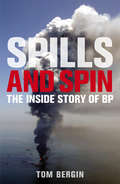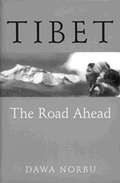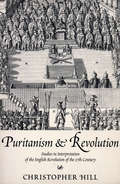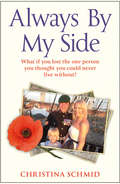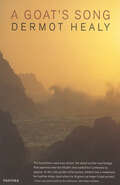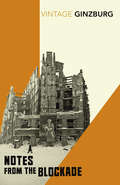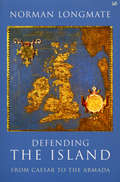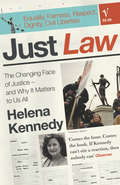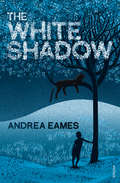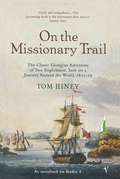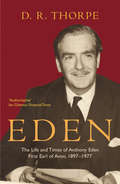- Table View
- List View
Dare To Be A Daniel: Then and Now
by Tony BennBorn into a family with a strong, radical dissenting tradition in which enterprise and public service were combined, Tony Benn was taught to believe that the greatest sin in life was to waste time and money. Life in his Victorian-Edwardian family home in Westminster was characterised by austerity, the last vestiges of domestic service, the profound influence of his mother, a dedicated Christian and feminist, and his colourful and courageous father, elected as a Liberal MP in 1906 and later serving in Labour Cabinets under Ramsay MacDonald and Clem Atlee. Benn followed in his father's footsteps, becoming one of the most famous and respected figures in modern British politics.Dare to be a Daniel feelingly recalls Tony Benn's years as one of three brothers experiencing life in the nursery, the agonies of adolescence and of school, where boys were taught to 'keep their minds clean' and the shadow of fascism and the Second World War with its disruption and family loss. This moving memoir also describes his emergence from World War Two as a keen socialist about to embark upon marriage and an unknown political future. The book ends with some of Tony Benn's reflections on many of the most important and controversial issues of our time.
The Master Strategist: Power, Purpose and Principle in Action
by Ketan J PatelSince the turn of the century, we have seen hopes of a new era of peace shattered by the 9/11 attack on the US. We have witnessed the US become embroiled in a divisive and seemingly unwinnable war in Iraq.. We have looked on as new nuclear rivalries have sprung up with Iran and North Korea. We have also seen Europe struggle to define its place in the New World Order. And we have observed the balance of world focus shift towards China and India as they have continued their unprecedented economic rise.What is the significance of all of this? Are these random events or is there an underlying pattern? What is required of leaders and individuals to propel the world in a more positive direction? The Master Strategist provides the means to decipher these changes, offering unique insights into the issues and patterns that are defining the future, and pointing the way to strategies for a freer and more peaceful and prosperous world.
Elizabeth: The Scandalous Life of an 18th Century Duchess
by Claire GervatElizabeth Chudleigh was one of the eighteenth century's most colourful characters. Born into impoverished gentility, her beauty, wit and vitality soon earned her a place at the centre of court life. When she married the Duke of Kingston in 1769 she had reached the highest rung of the social ladder. But Elizabeth was carrying a dark secret. In 1744 she had secretly married a naval lieutenant called Augustus Hervey, and after the Duke's death her first marriage was discovered. Bigamy fever swept London society and, in a very public trial, Elizabeth was found guilty. But her strength of character ensured that, even when her friends deserted her, her courage and zest for life did not. In an engaging history of this strong and wilful woman, Gervat shows there was far more to Elizabeth than the caricature villain her contemporaries made her out to be.
Of The People, By The People: A New History of Democracy
by Roger Osborne'Democracy is the worst form of government, except for all those other forms that have been tried from time to time.'Churchill had more reason than most to rue the power of democracy, having been thrown out of office after leading Britain to victory in 1945. Democracy, when viewed from above, has always been a fickle master; from below it is a powerful but fragile friend.Most books on democracy focus on political theory and analysis, in a futile attempt to define democracy. Of The People, By The People takes the opposite approach, telling the stories of the different democracies that have come into existence during the past two and half millennia. From Athens to Rhaetia, Jamestown to Delhi, and Putney to Pretoria, the book shows how democratic systems are always a reflection of the culture and history of their birthplaces, and come about through seizing fleeting opportunities. Democracy can only be understood through the fascinating and inspiring stories of the peoples who fought to bring it about.
Blood Kindred: W. B. Yeats, the Life, the Death, the Politics
by W J McCormackIn June 1934, W. B. Yeats gratefully received the award of a Goethe-Plakette from Oberburgermeister Krebs, four months after his early play The Countess Cathleen had been produced in Frankfurt by SS Untersturmfuhrer Bethge. Four years later, the poet publicly commended Nazi legislation before leaving Dublin to die in southern France. These hitherto neglected, isolated and scandalous details stand at the heart of this reflective study of Yeats's life, his attitudes towards death, and his politics.Blood Kindred identifies an obsession with family as the link connecting Yeats's late engagement with fascism to his Irish Victorian origins in suburban Dublin and industrializing Ulster. It carefully documents and analyses his involvement with both Maud Gonne and her daughter Iseult, his secretive consultations with Irish army officers during his Senate years, his incidental anti-Semitism, and his approval of the right-wing royalist group L'Action Française in the 1920s. The familiar peaks and troughs of Irish history, such as the 1916 Rising and the death of Parnell, are re-oriented within a radical new interpretation of Yeats's life and thought, his poetry and plays. As far as possible Bill McCormack lets Yeats speak for himself through generous quotation from his newly accessible correspondence. The result is a combative, entertaining biography which allows Ireland's greatest literary figure to be seen in the round for the first time.
An Orange Revolution: A Personal Journey Through Ukrainian History
by Askold KrushnelnyckyIn December 2004, the world watched as hundreds of thousands of Ukrainians gathered to defy the results of a transparently rigged presidential election. The charismatic popular candidate, Viktor Yushchenko, had been poisoned and disfigured by his opponents. The security forces threatened violent repression. But the demonstrators stayed and, as international pressure grew, the corrupt old regime that had been supported by Putin's Kremlin was deposed. It was the most significant moment for Europe since the fall of the Berlin Wall.An Orange Revolution is the gripping account of this historic uprising and the events that led to it. Ukraine was treated roughly by the twentieth century, occupied by the Germans and annexed by the Soviets. It saw guerrilla fighting after the Second World War and dissent was crushed by successive Communist administrations. Its history has been one of corruption, power struggles, organised crime, but a resiliently optimistic population.Based on firsthand observation and interviews with major players and anonymous demonstrators alike, this is about a people who have forced a lasting change: judges who defied death threats, a murdered journalist, amateur musicians who composed an anthem for the people, and soldiers who staked their lives to back the opposition. An Orange Revolution also traces the story of the author's family, who paid a high price for speaking out. An Orange Revolution is a captivating book about a defining moment in European history.
Rezso Kasztner: The Daring Rescue of Hungarian Jews: A Survivor's Account
by Ladislaus LöbTwo months after his eleventh birthday, on 9 July 1944, the gates of Bergen-Belsen concentration camp closed behind Ladislaus Löb. Five months later, with the Second World War still raging, he crossed the border into Switzerland, cold and hungry, but alive and safe. He was not alone, but part of a group of some 1,670 Jewish men, women and children from Hungary, who had been rescued from the Nazis as a result of a deal made by a man called Rezso Kasztner - himself a Hungarian Jew - with Adolf Eichmann, the chief architect of the Holocaust. Twelve years and a miscarriage of justice later Kasztner was murdered by an extremist Jewish gang in his adopted home of Israel. To this day he remains a highly controversial figure, regarded by some as a traitor and by many others as a hero. He was accused of betraying the bulk of the Hungarian Jewry by hand-picking only those who were politically and personally dear to him, or those from whom he could benefit financially, and the judge of his post-war trial concluded that he had 'sold his soul to Satan'.Rezso Kasztner tells his story - and also the story of a child who lived to grow up after the Holocaust thanks to him. A compelling combination of history and memoir, it is also an examination of one individual's unique achievement and a consideration of the profound moral issues raised by his dealings with some of the most evil men ever known.
Love Child
by Sue ElliottAdoption is one of the great, untold stories of our recent past. It is a truly epic tale of loss, guilt, identity, family feuds, reunion and redemption. It is a subject, until very recently, surrounded by secrecy and taboos. This is the heart-warming true story of a little girl's adoption in the 1950s and her search, nearly forty years later, for her birth mother. When mother and daughter meet, Sue thinks she has finally reached the end of her journey. Then Sue discovers she wasn't the only baby her mother gave away ...Weaved throughout is the vivid, emotional history of adoption in the UK. Drawing on a wide range of intimate personal experiences, it outlines the forces that shaped 20th century adoption practice, from baby-farming, the stigma of illegitimacy, incest and the bastardy laws, to children taken by force, the Magdalene laundries, mass emigration schemes without parental consent, to modern day adoption practices, buying babies from abroad, sperm donor fathers and tearful reunions on Trisha.
Making Terrorism History
by Scilla Elworthy Gabrielle RifkindEver since 9/11 it's been clear we need a new approach to terrorism. In this timely and important book the authors show:* The root causes of terrorism* The links between trauma and fundamentalism* Why people become suicide bombers* Why peace processes collapse* Whether non-violence is a useful response* What can be doneClear, radical and extremely persuasive, Making Terrorism History shows why political violence is now such a major force in our world. At the same time it gives a range of practical actions that can be taken to combat it, not only by our governments but also on the ground in Iraq, Israel and Palestine, and more widely. In addition there are many simple but effective steps that we, too, can take within our local communities to make peace - not war - on terror.
Brothers in War
by Michael WalshBrothers in War is the immensely powerful and deeply tragic story of the Beechey brothers, and how they paid the ultimate price for King and country. All eight went to fight in the Great War on such far-flung battlefields as France, Flanders, East Africa and Gallipoli. Only three would return alive. Even amid the carnage of the trenches, it was a family trauma almost without parallel. Their wives and sweethearts were left bereft, their widowed mother Amy devastated. It is a tragedy that has remained forgotten and unmarked for nearly 90 years. Until now.Kept in a small brown case handed down by the brothers' youngest sister, Edie, were hundreds of letters sent home from the front by the Beechey boys: scraps of paper scribbled on in the firing line, heartfelt messages written from a deathbed, exasperated correspondences detailing the absurdities of life in the trenches. From it all emerges the remarkable tale of the lost brothers.Tragic and moving, poetic in its intensity, Brothers in War reveals first-hand the catastrophe that was the Great War; all told through one family forced to sacrifice everything.
Behind the Black Door
by Sarah BrownIn this personal memoir about life at 10 Downing Street, Sarah Brown shares the secrets of living behind the most famous front door in the world.Sarah gave up a successful career in business to serve the country. A passionate campaigner for women and children, she mobilised over a million people through her early adoption of Twitter.If you've ever wondered what it's like to pack for a photo call with supermodels or pause a speech in front of hundreds when the autocue fails, it's all here - from what to do when the school play clashes with a visit to the White House to what it feels like to support the man you love as he takes tough decisions to stave off global financial meltdown...Intimate, reflective, surprising and funny, Behind the Black Door takes us backstage to reveal what it's like to be an ordinary woman, wife and mother in extraordinary circumstances.
Miss Angel: The Art and World of Angelica Kauffman, Eighteenth-Century Icon
by Angelica GooddenA word was coined to describe the condition of people stricken with a new kind of fever when the Swiss-born artist Angelica Kauffman (1741-1807) came to London in 1766. 'The whole world', it was said, 'is Angelicamad.' One of the most successful women artists in history - a painter who possessed what her friend Goethe called an 'unbelievable' and 'massive' talent - Kauffman became the toast of Georgian England, captivating society with her portraits, mythological scenes and decorative compositions. She knew and painted poets, novelists and playwrights, collaborating with them and illustrating their work; her designs adorned the houses of the Grand Tourists she had met and painted in Italy; actors, statesmen, philosophers, kings and queen sat to her; and she was the force that launched a thousand engravings. Despite rumours of relationships with other artists (including Sir Joshua Reynolds), and an apparently bigamous and annulled first marriage to a pseudo Count, Kauffman was adopted by royalty in England and abroad as a model of social and artistic decorum. A profoundly learned artist, but one who is loved, above all, for her tender adaptations from classical antiquity and sentimental literature; a commercially successful celebrity yet also a founding member of The Royal Academy of arts; the virginal creator of sexually ambivalent beings who was one of the hardest-headed businesswomen of her age, Kauffman's life and work is full of apparent contradictions explored in this first biography in over 80 years.
Britain's Royal Families: The Complete Genealogy
by Alison WeirFascinating and authoritative of Britain's royal families from Henry VIII to Elizabeth I to Queen Victoria, by leading popular historian Alison Weir 'George III is alleged to have married secretly, on 17th April, 1759, a Quakeress called Hannah Lightfoot. If George III did make such a marriage…then his subsequent marriage to Queen Charlotte was bigamous, and every monarch of Britain since has been a usurper, the rightful heirs of George III being his children by Hannah Lightfoot...' Britain's Royal Families provides in one volume, complete genealogical details of all members of the royal houses of England, Scotland and Great Britain - from 800AD to the present. Drawing on countless authorities, both ancient and modern, Alison Weir explores the crown and royal family tree in unprecedented depth and provides a comprehensive guide to the heritage of today's royal family – with fascinating insight and often scandalous secrets.'Staggeringly useful... combines solid information with tantalising appetisers.’ Mail on Sunday
The Cliveden Set
by Norman RoseLloyd George once spoke of 'a very powerful combination - in its way the most powerful in the country'. Its proceedings were invariably conducted at Cliveden, the country estate of the fabulously wealthy Nancy and Waldorf Astor. Collectively dubbed 'God's Truth Ltd', the group included leading politicians, academics, writers and newspaper editors. Its pedigree impeccable, its social standing beyond reproach, its persuasive powers permeated the clubs and institutions of London, the senior common rooms of Oxbridge colleges, the quality press and the great country houses of England. Suddenly, in the late 1930s, the 'Cliveden Set' was catapulted into uncalled-for notoriety. It had been identified as a cabal that sought to manipulate, even determine, British foreign policy in order to uphold its narrow class interests. It would use any means, however devious - even negotiate a humiliating, dishonourable settlement with Nazi Germany - to maintain its privileges, those of a decaying ruling class. But was the 'Cliveden Set' a traitorous cabal, challenging 'the constitutional structures of British democracy', or simply an unstructured think-tank of harmless do-gooders? Norman Rose discerningly probes this fascinating tale, brilliantly disentangling fact from fiction, and setting this privileged clique in the wider perspective of its times.
Spills and Spin: The Inside Story of BP
by Tom BerginIn April 2010, the world watched in alarm as BP's Macondo well suffered a fatal explosion and a catastrophic leak. Over the next three months, amid tense scenes of corporate and political finger-pointing, millions of barrels of crude oil dispersed across the Gulf of Mexico in what became one of the worst oil spills in history.But there is more to BP's story than this. Tom Bergin, an oil broker turned Reuters reporter, watched the 'two-pipeline company' of the early 1980s grow into a dynamic oil giant and PR machine by the turn of the twenty-first century. His unique access to key figures before, during and after the spill - including former CEO Tony Hayward - has enabled him to piece together this compelling account of a corporation in crisis, and to examine how crucial decisions made during BP's remarkable turnaround paved the way for its darkest hour.
Tibet: The Road Ahead
by Dawa NorbuTibet: The Road Ahead is the extraordinary account of the potential extinction of a civilisation. Written by a gifted Tibetan of humble origins, this book tells the story of ordinary Tibetans in the twentieth century.Professor Norbu refutes China's claim that Tibet has been part of China since the seventh century AD, showing how the relationship between the two countries was symbolic and ceremonial, rather than one of political suppression. He portrays pre-1950 Tibet as a place of complete and genuine freedom, in stark contrast with recent events in the region.Beautifully written and offering a fresh, incisive look at the road ahead for Tibet in post-Deng China, this book will appeal to all those fascinated by, and concerned for 'the land of the snows'.
Puritanism & Revolution
by Christopher HillThis illuminating collection of essays assesses the seventeenth century, interpreting what used to be called 'The Puritan Revolution', the ideas which helped to produce it and resulted from it, and the relation between these ideas and the political and economic events of the day. Each essay approaches the subject from a different angle, looking at aspects of the revolution - whether religious, constitutional, economic or biographical - in conjunction with a lively sympathy for the men who lived in that revolutionary time. Analysing the writings of Marvell, Hobbes, Harrington and Samuel Richardson, as well as less 'respectable' writers, Professor Hill examines the legacy of the Reformation and the inspiration provided by ideals like the Brotherhood of Man and the desire to re-create a pre-Norman Golden Age. A book that no serious student of our history should miss; it is a treasury of interesting detail and strong ideas, CV Wedgwood.
Always By My Side: Losing the love of my life and the fight to honour his memory
by Christina SchmidA LOVE LOST.A LIFE CUT SHORT.'From the moment I set eyes on him I adored him. The connection between us was so strong it went beyond everything else. His job, my job, his lifestyle, my lifestyle. All that fell away.'And then one earth-shattering day Christina's worst nightmare came true when Oz was killed on his final day of duty before flying home to his family.This is Christina and Oz's story: a story about love and loss, hope and despair and of living in constant fear. Christina's extraordinary bravery and composure is an inspiration to anyone who has ever lost someone they love.
A Goat's Song
by Dermot HealyIn a wind-battered Mayo cottage, playwright Jack Ferris tries to salvage something from his broken love affair with Catherine Adams. Drink and despair drove her away; can his imagination call her back? But as he summons up her past, Jack finds he has also called up Catherine's RUC father and a whole dangerous world of opposed traditions.
Notes From the Blockade
by Lydia GinzburgThe 900-day siege of Leningrad (1941-44) was one of the turning points of the Second World War. It slowed down the German advance into Russia and became a national symbol of survival and resistance. An estimated one million civilians died, most of them from cold and starvation. Lydia Ginzburg, a respected literary scholar (who meanwhile wrote prose 'for the desk drawer' through seven decades of Soviet rule), survived. Using her own using notes and sketches she wrote during the siege, along with conversations and impressions collected over the years, she distilled the collective experience of life under siege. Through painful depiction of the harrowing conditions of that period, Ginzburg created a paean to the dignity, vitality and resilience of the human spirit.This original translation by Alan Myers has been revised and annotated by Emily van Buskirk. This edition includes ‘A Story of Pity and Cruelty’, a recently discovered documentary narrative translated into English for the first time by Angela Livingstone.
Defending The Island: From Caesar to the Armada
by Norman LongmateIn a brilliantly imaginative blend of military, social and diplomatic history, Norman Longmate retells our island story from the perspective of its defenders, in a narrative which stretches from the Celtic tribes who unsuccessfully fought against Ceasar to the great seabourne defence against the Armada of Philip of Spain. He has gone back to the original sources and investigated the original battlegrounds and weak spots in Britain's defences. But the real strength of his book is its seamless narrative of history, which uncovers the truth behind the legends. A mass of solidly researched fact, not readily found elsewhere, is seasoned with lively, humorous and occassionally gruesome anecdote. The result, providing at once an invaluable sourcebook for the specialist and an enthralling narrative for the general reader, is by far the most comprehensive and accessible history of England versus invasion ever published.
Just Law
by Helena KennedyAcute, questioning, humane and passionately concerned for justice, Helena Kennedy is one of the most powerful voices in legal circles in Britain today. Here she roundly challenges the record of modern governments over the fundamental values of equality, fairness and respect for human dignity. She argues that in the last twenty years we have seen a steady erosion of civil liberties, culminating today in extraordinary legislation, which undermines long established freedoms. Are these moves a crude political response to demands for law and order? Or is the relationship between citizens and the state being covertly reframed and redefined?
The White Shadow
by Andrea Eames‘Look after your sister, Tinashe.’ When Hazvinei was born, Tinashe knew at once that there was something different about her. Growing up in a rural Rhodesia still haunted by memories of the recent guerilla wars, Tinashe knows he must take extra care of his sister. But Hazvinei is a wild spirit and soon the village starts to whisper – dark talk of curses and spirits. Tinashe is prepared to follow his sister anywhere – but how far can he go to keep her safe when the forces threatening her are so much darker and more sinister than he suspected?
On The Missionary Trail
by Tom HineyThis is the strange and wondrous story of an eight-year voyage and a mission to save souls. Their mission started in the South Seas, where they reported scenes of chiefs surfing, perpetual warfare and a sudden surge of Christianity. From there they went via New Zealand, Australia and its aboriginal hinterland, through 'the Orient' to India and slave-ridden Mauritius. Based on contemporary journals, mission reports, letters and illustrations, and bursting with character and anecdote. ON THE MISSIONARY TRAIL is both the enthralling narrative of the longest missionary voyage ever undertaken and a colourful, detailed, eye-opening snapshot of little-known worlds, set against the wider picture of evangelism and guilt, heroism and humanity.
Eden: The Life and Times of Anthony Eden First Earl of Avon, 1897-1977
by D R ThorpeAnthony Eden, who served as both Foreign Secretary and Prime Minister, was one of the central political figures of the twentieth century. He had good looks, charm, a Military Cross from the Great War, an Oxford first and a secure parliamentary constituency from his mid-twenties. He was Foreign Secretary at the age of 38, and the first British statesman to meet Hitler, Mussolini and Stalin. Eden's dramatic resignation from Neville Chamberlain's Cabinet in 1938, outlined here in the fullest detail yet, made an international impact.This ground-breaking book examines his controversial life and tells the inside story of the Munich crisis (1938), the Geneva Conference (1954), Eden's battles with Churchill over the modernisation of the post-war Conservative Party and his rivalry with Butler and Macmillan in the early 1950s, culminating in a fascinating analysis of the Suez crisis.
